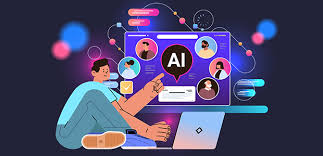The growth of Artificial Intelligence (AI) has opened up new avenues for technological innovation to try out a much bigger function in your life. From online assistants to personal-traveling vehicles, AI has come a long way to reinvent the way you live and function. A great development has been the appearance of AI companions. These are typically designed as online friends who are able to give friendship and help for those who battle to construct human being relationships. While some people recommend their AI friends, other people stay unconvinced. In this particular blog post, we will explore the field of AI companions and discover whether they are really the future of connections.
AI Companion are made to mimic human connections and present a sense of companionship to people who have trouble creating societal contacts. They come in many forms, including chatbots to wise robots that could engage in chats and convey feelings. Some AI buddies, like Replika, are created to learn from their users’ habits and adapt to their character traits. Others, including Aibo, are robotic pets that can give feelings of companionship and mental help with their users.
One of the major advantages of AI friends is simply because they may be incredibly helpful for those who really feel isolated or lonesome. As an example, seniors who are living alone can be helped by the organization of the AI companion, who are able to provide emotionally charged assist whilst keeping them interested. In the same manner, people who have societal nervousness or autism variety problem can also discover it simpler to develop links with no stress of in-individual connections.
However, some experts have depicted worry about the impact of AI companions on individual connections. Given that AI buddies are meant to mimic individual conduct, you will discover a chance that they may change true human contacts for a few people. Research shows that folks who frequently communicate with AI friends may develop unrealistic expectations and grow a lot less satisfied with human interactions.
Yet another problem is that AI buddies could become a form of dependency, exactly where men and women become dependent on them for psychological help and interaction. This can lead to a predicament where by individuals become more isolated and depend solely on technological innovation for friendship. Furthermore, you have the question of how AI buddies will handle challenging circumstances and sensations, like suffering or reduction. Can they adequately replace the support and sympathy of human interactions?
In short:
In In short, AI companions stand for a fascinating growth on earth of technological innovation and connections. They can offer useful assistance and companionship to people who have a problem with sociable contacts, and can be incredibly helpful for particular sets of men and women. Even so, there is a need to be mindful from the probable downsides of AI friends, including the risk of habit and unlikely anticipations. Ultimately, AI buddies are not a substitute for genuine man contacts, and it is very important maintain a healthy balance between technology and private partnerships.
